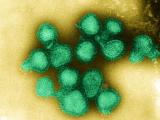Oct 15, 2010 (CIDRAP News) – Most people with an egg allergy can safely receive an influenza vaccine, and they don't need a skin test first, according to new recommendations from the American Academy of Allergy, Asthma and Immunology (AAAAI).
Medical authorities have long urged caution concerning flu shots for those with egg allergies because of the concern that residual egg protein in the vaccines, which are grown in eggs, might cause a reaction. But the AAAAI says several recent studies have shown that egg-allergic people can be safely vaccinated.
The guidelines advise that allergic patients can be vaccinated with either a two-step, graded approach or with a single dose, followed in either case by 30 minutes of observation for allergic symptoms. The guidelines were prepared by Matthew J. Greenhawt, MD, MBA, of the University of Michigan in Ann Arbor, and James T. Li, MD, PhD, of the Mayo Clinic in Rochester, Minn.
"There has been tremendous growth over the past year in demonstrating that TIV [trivalent influenza vaccine] (and H1N1 [vaccine]) are safe for egg allergic individuals to receive," the AAAAI statement says. "While a few concepts bear further study, such as the safety of these vaccines in individuals with severe allergy to egg, it appears that most egg allergic patients can safety receive influenza vaccination if desired."
The group recommends use of the vaccine containing the lowest amount of ovalbumin, even though there is no conclusive evidence that ovalbumin is what triggers adverse reactions to flu vaccine in egg-allergic people. Most manufacturers now list the ovalbumin content for each vaccine lot, and studies last year showed that the listed amounts were accurate, the statement says.
The AAAAI experts also say egg-allergic people no longer routinely need skin testing for sensitivity to the vaccine before they are immunized. "Though skin testing has been used successfully in the past, recent data have indicated that neither prick testing nor intradermal skin testing using the vaccine is predictive of one's ability to tolerate the vaccine, nor was testing necessary to receive a booster dose from a different lot than the original dose," they state.
The statement recommends that patients who have a history of suspected egg allergy be evaluated by an allergist. But even if the egg allergy is confirmed, the patient can still be vaccinated using either the two-dose or single-dose protocol followed by observation.
The two-step approach involves first giving the patient 10% of the age-appropriate dose, waiting 30 minutes, and then, if no symptoms develop, following up with a 90% dose. The patient should be observed for another 30 minutes after the second dose. If a reaction occurs after any step, further steps should be withheld and the patient should be referred to a vaccine allergy expert, the AAAAI advises.
The current flu vaccine information statement from the Centers for Disease Control and Prevention (CDC) says people with severe egg allergy should not be vaccinated. The AAAAI says three recent studies have indicated that flu vaccines are safe even for such patients, but the study samples were small.
"While these results are promising, they must be interpreted cautiously given the sample size," the AAAAI statement says, adding that a multi-center trial further examining this issue is under way in the United States.
The authors say present evidence suggests that administering the vaccine in more than two steps is probably unnecessary, but multiple-step protocols remain an option for providers who are concerned about particular patients, such as those with a history of anaphylactic reaction to flu shots.
See also:
AAAI statement "Administering Influenza Vaccine to Egg Allergic Recipients"
Current CDC information statement for inactivated flu vaccine
http://www.cdc.gov/vaccines/pubs/vis/downloads/vis-flu.pdf



















